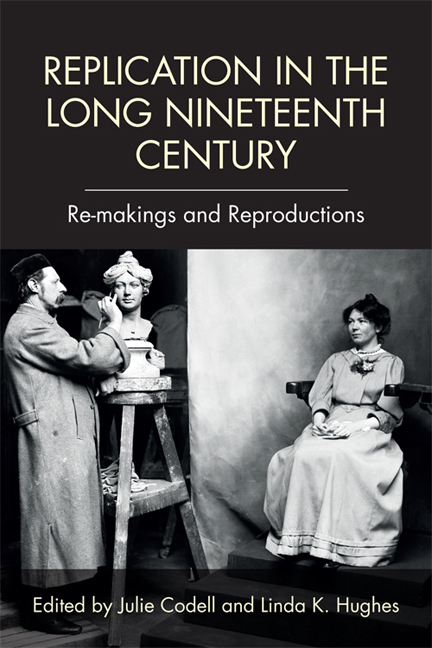Book contents
- Frontmatter
- Contents
- List of Illustrations
- Acknowledgments
- 1 Introduction: Replication in the Long Nineteenth Century – Re-makings and Reproductions
- I Replication and Networks
- II Replication and Technology
- III Replication and Authenticity
- IV Replication and Time
- 13 “Seeking Nothing and Finding It”: Moving On and Staying Put in Mugby Junction
- 14 The Origins of Replication in Science
- 15 Fathers, Sons, Beetles, and “a family of hypotheses”: Replication, Variation, and Information in Gregory Bateson's Reading of William Bateson's Rule
- 16 Afterword: The Implications of Nineteenth-Century Replication Culture
- Notes on Contributors
- Index
15 - Fathers, Sons, Beetles, and “a family of hypotheses”: Replication, Variation, and Information in Gregory Bateson's Reading of William Bateson's Rule
from IV - Replication and Time
Published online by Cambridge University Press: 11 August 2018
- Frontmatter
- Contents
- List of Illustrations
- Acknowledgments
- 1 Introduction: Replication in the Long Nineteenth Century – Re-makings and Reproductions
- I Replication and Networks
- II Replication and Technology
- III Replication and Authenticity
- IV Replication and Time
- 13 “Seeking Nothing and Finding It”: Moving On and Staying Put in Mugby Junction
- 14 The Origins of Replication in Science
- 15 Fathers, Sons, Beetles, and “a family of hypotheses”: Replication, Variation, and Information in Gregory Bateson's Reading of William Bateson's Rule
- 16 Afterword: The Implications of Nineteenth-Century Replication Culture
- Notes on Contributors
- Index
Summary
Sometimes – often in science and always in art – one does not know what the problems were till after they have been solved. (G. Bateson 271)
In 1894 the young Cambridge biologist William Bateson published a book about evolution entitled Materials for the Study of Variation: Treated with Especial Regard to Discontinuity in the Origin of Species. Bateson hoped it would be a groundbreaking book; he signaled that in the reference to both “discontinuity” and “the origin of species” in his sub-title, the book announcing its intent to begin to question the received authority of Darwinism. Skeptical of the dominant paradigms for organizing and interrogating evolutionary evidence of variation and selection, Bateson accumulated and published a vast range of facts to challenge Darwin's ascendancy. Among the huge range of sample specimens from museums, private collections, journals, and illustrations, Bateson included some beetle (Coleoptera) specimens manifesting an oddness of character – supernumerary legs – that he sought to explain with reference to a phenomenon that became known as Bateson's Rule. As I will argue, Bateson's Rule presented multiple, and thus over time quite far-reaching, implications for ideas about replication – or “reduplication,” as Bateson called it – adding to the stockpile of terms that we have inherited from the Victorian period for assessing the place of ideas about mimicry, imitation, replication, and reproduction in biology and culture.
Gregory Bateson was an ethnographer, biologist, ethologist, theorist of systems, and author of the seminal work Steps to an Ecology of Mind (1972); he was also William Bateson's youngest son. Over time – seventy-eight years, to be precise – he came to appreciate the role of his father's rule in understanding patterns of replication and variation in morphogenesis – or the development of shape in an organism – to begin with, and then over a wide range of contexts and systems. He set this out in the essay “A Re-examination of ‘Bateson's Rule,’” and other essays that were collected together to make Steps. One of the aims of this present volume is to explore the historical roots of both imaginative and anxious responses to replication in scientific and cultural systems. Consequently, this chapter is framed around the complex passages of time and acts of information exchange through which the passing on of ideas across three generations in an intellectual family occurred.
- Type
- Chapter
- Information
- Replication in the Long Nineteenth CenturyRe-makings and Reproductions, pp. 269 - 288Publisher: Edinburgh University PressPrint publication year: 2017

